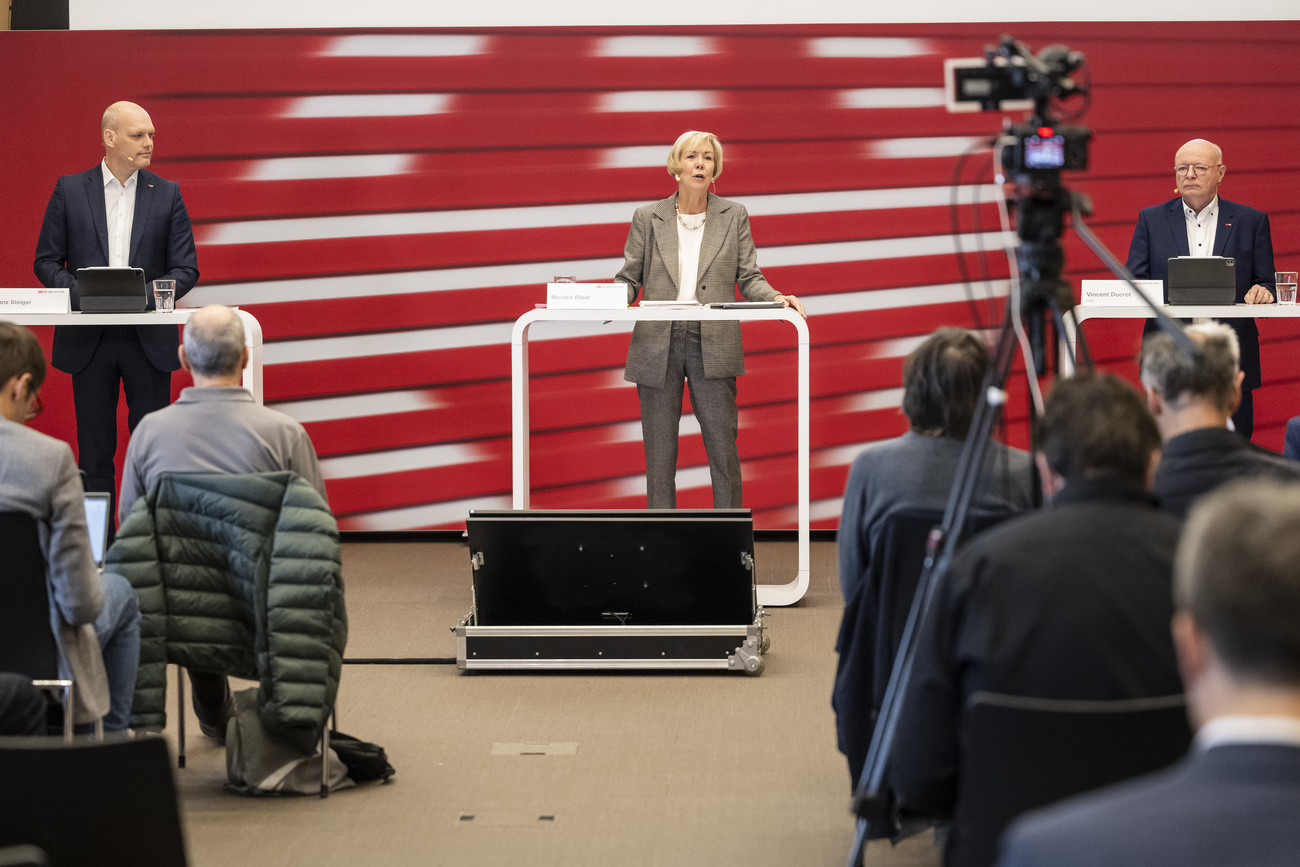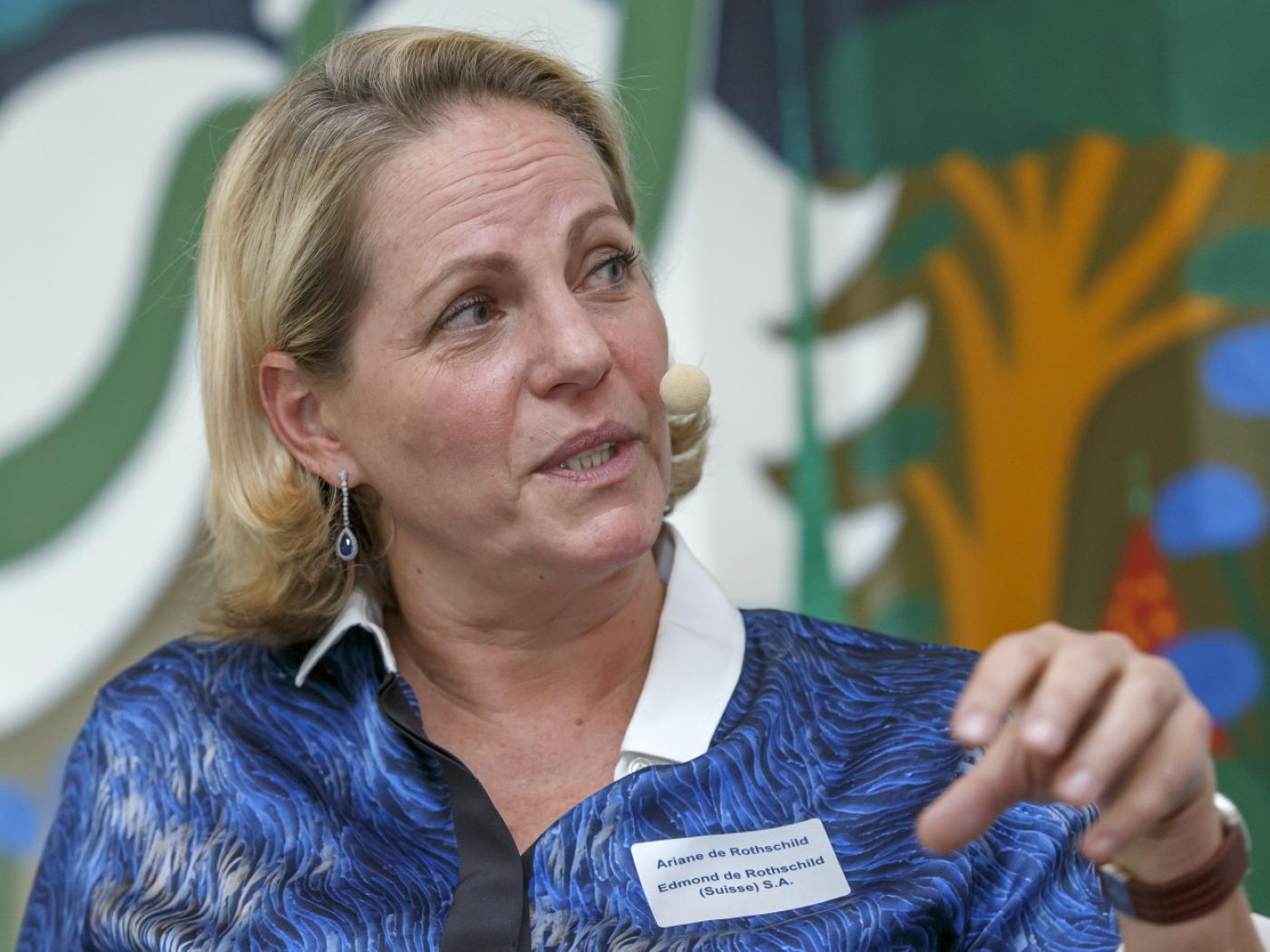
Monika Ribar, the chair of the board of directors of Swiss Federal Railways and the former CEO of Panalpina, says she gave up “a great many things” to pursue her career. While she is opposed to quotas for women on management boards, she believes attitudes still need to change to advance equality in the world of work.
Few women in Switzerland have made a career comparable to that of Monika Ribar, the current chair of the board of directors of Swiss Federal Railways. She reached the top of a traditionally male-dominated industry through hard work – Ribard does not hail from a big family of entrepreneurs or businesspeople that could boost her professional fortunes. SWI swissinfo.ch met Ribar in the Zurich offices of Swiss Federal Railways to discuss the challenges of achieving gender balance in the workforce.
Born in 1959, Monika Ribar holds a master’s degree in economics and business administration from the University of St. Gallen.
After starting her career with Fides Group (now KPMG Switzerland) and BASF Group, Ribar joined Panalpina in 1991. At this Basel-based logistics company, she held various management positions, including Chief Information Officer and Chief Financial Officer before serving as CEO from 2006 to 2013.
She became a professional director in 2014 and has chaired the board of directors of Swiss Federal Railways since 2016. She is also a director of Sika and has served on the boards of Chain IQ Group AG, Logitech, Swiss International Airlines, Julius Bär, Rexel and Lufthansa.
SWI swissinfo.ch: Are you satisfied with the gender balance at Swiss Federal Railways?
Monika Ribar: The current situation isn’t bad, and it has improved, but I can never be fully satisfied because this is a never-ending task. As far as the board of directors is concerned, we already have four women out of nine members; on the executive board, however, only two of nine members are women. But the bottom line is that we have never felt we had to recruit a woman if she didn’t have all the necessary skills.
SWI: Is the improvement also reflected in your figures for employees as a whole?
M.R.: Definitely. In 2008, women accounted for 13.9% of our workforce compared with 19% today, despite the fact that many of our jobs are very physical and better suited to men. As far as managers go, we have gone from 7.6% women to 16% over the same period.
SWI swissinfo.ch: What do you think of the lawExternal link encouraging listed companies to have at least 30% women on their boards of directors and at least 20% on their executive boards?
M.R.: I’m not in favour of women’s quotas or, more generally, the idea of solving everything with legislation. In my view, the most important thing is for companies to be convinced of the added value of employing women. On boards of directors, for example, women can really bring a new approach. I encourage companies to have at least two female directors, as this lends them a certain security and encourages them to express themselves more.

SWI: Initially, this law was seen as a simple incentive, but it has become almost mandatory under pressure from investors and even customers.
M.R.: It’s precisely for this reason that I’m against over-legislating, as market pressure generally has a far greater impact on both listed and unlisted companies.
SWI: In large Switzerland-based companies, the majority of female directors are foreigners. Is this an advantage or a problem?
M.R.: It’s an asset in terms of diversity, but a shame for Switzerland as a business location. On this issue, let me point out that there was only one Swiss director on Credit Suisse’s board, in addition to the chair. The composition of a board of directors is important. For a Swiss company like Swiss Federal Railways, it’s important to have a high proportion of Swiss members. But I would also like to stress one positive point: Swiss women who are now members of management committees will automatically become candidates for board positions.
SWI: Some academic studies indicate that a high percentage of female executives means superior performance. What’s your take on this?
M.R.: In my experience, mixed teams are better able to make the right decisions, which leads to better results. The advantage of diversity in management teams is that everyone is confronted with the ideas of others.
SWI: Is diversity limited to gender parity?
M.R.: No, it encompasses all dimensions of human diversity, including professional and international experience and, in the Swiss Federal Railways context, language regions of origin. It is also essential for some members of a board of directors to have a thorough grasp of operational details. It’s equally important that other members less familiar with these details do not hesitate to ask unexpected questions.
SWI: According to the World Economic Forum’s Global Gender Gap Report 2024External link, it will take 134 years to achieve gender parity at the current rate of progress. Why is it taking so long?
M.R.: I’m not surprised. In 80% of countries, women are fundamentally not considered to be on an equal footing with men. In some cases, they don’t even have access to schooling, or they can’t choose their husbands. All this has more to do with social attitudes than with legislation. And in the United States, the abortion ban is even now still a subject of discussion.
SWI: According to the same WEF report, Switzerland ranks 20th out of 146 countries. What do you think of this ranking?
M.R.: Switzerland has come a long way. Women didn’t gain the right to vote until 1971. Until 1988, married women were not even allowed to work without their husband’s consent. Working women were frowned upon, and to some extent this is still the case, as society is still structured for men to work and women to stay at home. Fortunately, Switzerland has made significant — albeit slow — progress, especially in terms of attitudes.
SWI: Again, according to the WEF report, one of Switzerland’s key weaknesses (99th position) is the disparity in “estimated earned income” between men and women. How do you explain this?
M.R.: There’s nothing surprising about that because many women work part-time or not at all in Switzerland. Or they do work, but for little or no pay. Switzerland’s wealth means that many married women are not obliged to contribute to the family income, in contrast to many other countries where their contribution is essential.
SWI: What would you recommend to improve gender parity and diversity?
M.R.: Above all, I think we need social change. For example, companies must learn to give more consideration to people whose career paths include career breaks, usually following maternity or paternity leave of three to six years. And even as a liberal, I’m in favour of state aid, particularly to expand childcare facilities and reduce their costs. The introduction of individual taxation is also an imperative.
As far as Swiss Federal Railways is concerned, our colleagues can work from home or part-time. We also offer courses for men and women on returning to work after a career break. All these initiatives have won us various awards as an employer.
SWI: Career-minded women are often active in women-only professional organisations. Is this a good idea?
M.R.: Networking is essential for building a career. However, this networking doesn’t necessarily have to take place within women-only organisations such as the Cercle Suisse des AdministratricesExternal link or The BoardroomExternal link.
It’s also essential to network within one’s own company; during my executive career, I worked hard at it, and it enabled me to make sure people knew me. I even went to a club with my male colleagues once.
At these internal networking events, I was almost always the only woman. I think it’s a pity that my female colleagues had to go straight home to look after their children and had no opportunity to enjoy a drink with other employees.
SWI: What other advice do you have for career-minded young women?
M.R.: Most of my advice is not gender specific. The most important thing is to do what you do with enjoyment, because you do it better and that’s the best way to build a career. You also need healthy self-confidence and, above all, a strong will. Finally, you need to be sincere, curious and willing to reach out to people.
I never planned to become the CEO of [logistics company] Panalpina or the president of Swiss Federal Railways, but I absolutely wanted to get involved and achieve something great. I was prepared to give up a great many things to do this. For example, during my executive career, I simply didn’t have the time to have lunch or go to the movies with my husband during the week.
I didn’t decide not to have children – it just turned out that way. I’ve never missed being a mother and I’m convinced that I could never have had this career if I’d had children. Even today, it would still be extremely difficult.
Edited by Samuel Jaberg/ds
Full story here Are you the author? Previous post See more for Next postTags: Featured,newsletter





























